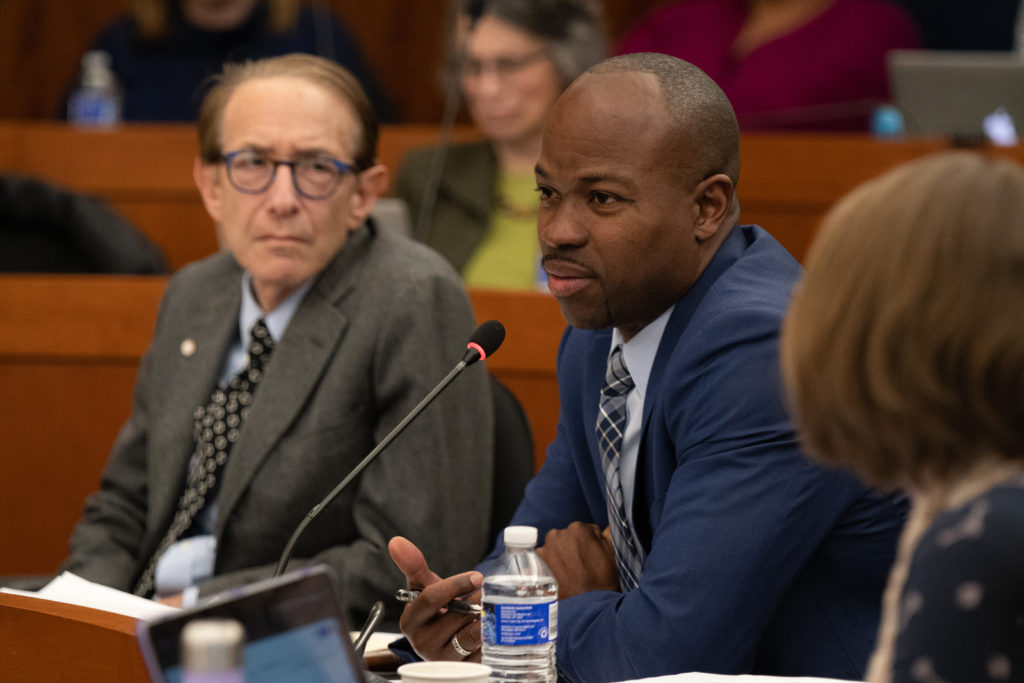Officials say they are taking steps to limit the effect of a potential drop in international enrollment in the Class of 2024 resulting from the COVID-19 pandemic.
Administrators said at a Faculty Senate meeting Friday that they expect the number of international students in next year’s freshman class to drop as travel restrictions become more prevalent to curb the spread of the virus. They said they have taken steps, like growing the size of GW’s waitlist and changing the composition of the incoming class to add more transfer students, to mitigate the risk to GW’s incoming class and finances.
“We are taking every step that we can think of and trying to build in contingencies along the way to mitigate the potential harm caused by this virus to our enrollment,” University President Thomas LeBlanc said at the meeting.
LeBlanc said that as the pandemic continues to spread, international students may find themselves facing uncertainty about their ability to leave their home country or travel to the United States. Even if students don’t face formal restrictions, the threat of the virus may discourage them from traveling far to attend college, he said.
“Those of you who remember the immediate aftermath of 9/11, a lot of students didn’t want to travel as far to college,” LeBlanc said. “Some of the yield models got upset because people were used to having people go from New York to California, and some students said, ‘I’m not doing that.’”
He added that any enrollment or financial impacts from reduced international student matriculation will impact graduate programs more intensely than other programs because many graduate programs are largely dependent on tuition from international students.
Roughly 94 percent of graduate enrollment in the statistics program and 91 percent of enrollment in the graduate finance program consists of international students, according to institutional data. International graduate students constitute the majority of the business analytics program at 89.8 percent, the computer science program at 86.5 percent and the mechanical and aerospace engineering program at 73.5 percent.
“We absolutely reserve the right to be rational in the face of the coronavirus and everything else we’re doing,” LeBlanc said. “We’re going to have to be rational with every decision we make to certainly not make the situation even worse.”
Provost Brian Blake said at the senate meeting that officials have modeled a 5 percent reduction in the size of next year’s class to comply with the 20/30 Plan, which will absorb some of the impact of reduced interest from international students. He added that next year’s admitted class will also have more transfer students – who received smaller tuition discounts on average than non-transfers – which will also mitigate the loss of some international student tuition revenue.
Blake said officials have stress-tested GW’s financial models with a decrease in international student enrollment of roughly 5 to 6 percent lower than the baseline and are anticipating a smaller yield rate among admitted international students.
Enrollment officials have increased the size of GW’s waitlist in anticipation of the decreased yield rate, administrators said at the meeting.
“When you look at the top end of it, it would make a difference, but it wouldn’t be devastating,” Blake said about the drop in international enrollment.
Enrollment experts said the lack of comparable historical events make the potential effects of the COVID-19 pandemic difficult to predict. But they added that administrators should aim to maintain a sense of community even as students are displaced from campus through measures like interactive content and videos for admitted students.
James Steen, the vice president for enrollment management at Houston Baptist University, said “all of the historical trends” used in predicting enrollment have been “completely altered” by the virus. He said that while natural disasters like Hurricanes Ike and Harvey caused colleges to close, COVID-19 is unique in occurring at a time when students are receiving admissions decisions and committing to universities.
“We respond to the challenges and issues as best we can and then do what we have always done to support prospective students and help them make the best, most informed decision about where they will enroll this fall,” he said.
He said the longer the pandemic lasts, the greater impact the impact the virus will have on higher education. He said college officials may find themselves needing to postpone or move new student orientations online if social distancing continues into the summer.
Stacey Kostell, the chief executive officer of the higher education organization Coalition for College, which maintains the Coalition Application, said one consequence of the virus – canceled campus tours – may make it difficult for admitted students to determine whether a school is the right one for them.
“Attending a program on campus often helps students find the right fit,” Kostell said. “Without that opportunity, students will need to rely on virtual tours, social media accounts, and connections with alumni, students and faculty at their top schools to help guide their decisions.”
Paul Marthers, the vice provost for enrollment management at Emory University, said his school is expanding online outreach to admitted students and preparing interactive content and videos that will be used in place of on-campus visits, which have been canceled.
He said Emory is facing a “great deal of nervousness and speculative thinking” about COVID-19’s impact on enrollment, adding that his university also expects potential drops in international student enrollment as more students choose local colleges or more admitted students defer enrollment until next year.
“At this time of year in the admissions cycle, no matter the year, as much as we try to fine tune our predictive models, we always know that there is a high degree of unpredictability,” he said. “This year that level will be even higher than usual. That’s about all we are certain of at this point.”




